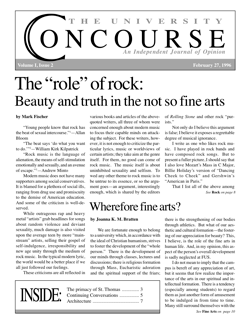Commendations (2)
by Regis Martin
Congratulations on your maiden issue! It looks as if you’ve launched a wise and worthy endeavor. Long may it prosper!
I particularly want to commend you for your statement of purpose, set out most ably on the Editor’s Page; the invitation to honest and intelligent debate, conducted with charity, is a worthwhile pursuit. And in that irenic spirit might I take issue with a sentence you wrote? “Even the doctrines of our Faith, though given to the Church once and for all, were not given in finished form, but rather as ‘seeds’, so that our understanding of them has been emerging only gradually across centuries of Christian experience…” I think I understand what you mean here and I’ve no quarrel with it. But an implication survives its intended meaning, fed by an ambiguity you doubtless had not intended, which strikes me as unfortunate.
In the first place, what was given to the Church two millennia ago were not doctrines to be unpacked over time, but a Person to be encountered in time and at any time. Christ is not therefore any sort of seed whose growth we may chart gradually over the course of centuries, those of us privileged to live at the end of the 2nd millennium somehow better situated to interpret His message. Rather He is the Word whose enfleshment took place at a particular time and thus all time is intersected, all history suffused, with his Gracious Presence.
And, point two, to the extent His coming has vouchsafed certain doctrines which the Church holds in her memory, these are not understood in a better or richer or deeper way simply in virtue of one’s having lived at a later date; to think that is to fall prey to that “chronological snobbery” C.S. Lewis warns against. St. Iranaeus, for example, who is rightly regarded as the Father of Western Theology, advanced an understanding of the Incarnation back in the 2nd century (see his stunning polemic against the Gnostics who contested the Event), which I don’t think modern thought is likely to supersede any time soon. The same might be said of Augustine’s psychology of conversion (see Book VIII of his Confessions). There are of course other examples I might cite. But the point of them all is to remind us, in humility, of numberless “dead Masters” whose accumulated wisdom provides the patrimony on which we, their grateful heirs, draw.
Once again, congratulations on what you’ve done and may the forum you’ve created flourish amid the University community.
Dr. Regis Martin, Associate Professor of Theology
The editors reply:
We are grateful for Dr. Martin’s kind remarks, and for his notice of an ambiguity we had overlooked in the introductory editorial of our maiden issue.
We certainly did not mean to imply that the Divine Mysteries themselves have been developing over time, nor that believers today are in a superior position regarding the possibility of communion with the Holy Trinity. Nevertheless, we defend our statement in so far as it referred to the doctrines of the Church. Here we claim the authority of Cardinal Newman’s theory of the development of doctrine. Consider the following famous passage from his Oxford University Sermons, regarding the “history of the formation of any Catholic dogma:”
“What a remarkable sight it is…to see how the great idea takes hold of a thousand minds by its living force…and grows in them, and at length is born through them, perhaps in a long course of years, and even successive generations; so that the doctrine may rather be said to use the minds of Christians, than to be used by them. Wonderful it is to see with what effort, hesitation, suspense, interruption,—with how many swayings to the right and to the left—with how many reverses, yet with what certainty of advance, with what precision in its march, and with what ultimate completeness, it has been evolved; till the whole truth ‘self-balanced on its centre hung,’ part answering to part, one, absolute, integral, indissoluble, while the world lasts! Wonderful, to see how heresy has but thrown that idea into fresh forms, and drawn out from it farther developments, with an exuberance which exceeded all questioning, and a harmony which baffled all criticism…And this world of thought is the expansion of a few words, uttered, as if casually, by the fishermen of Galilee.” (p.317 of the standard edition)
Not (of course) that any one of us, subjectively speaking, is more capable of religiously grasping the truths of the Faith than were the early Christians, but that as a whole the Church’s understanding of the “idea” of Christianity has been developing over time. In at least one sense, then, today’s believers are in a privileged position (and required to bear its attendant responsibilities) precisely because we are the heirs of 20 centuries of accumulated Christian wisdom.


